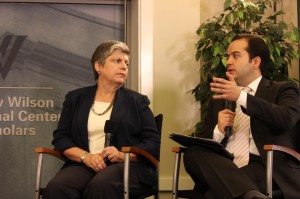U.S.-Mexico partnership to remain close when PRI returns to power
Scripps Howard Foundation Wire

WASHINGTON – The election of Institutional Revolutionary Party candidate, Enrique Peña Nieto, who will replace President Felipe Calderón in December raises the question of whether Mexico will continue to cooperate with the United States.
Calderón, in particular, has worked with the U.S. on the Merida Initiative to fight drug cartels.
“It is true we will face significant challenges, it is true that we also need to keep on working very hard on a systematic basis to resolve the issues that are naturally coming towards us in this very complex relationship,” Mexico’s Secretary of the Interior Alejandro Poiré said Monday at a panel discussion. “But I think it is a testimony to the efforts of both administrations, President Calderón’s administration and President [Barack] Obama’s administration, that we are here and now speaking about all these enhancements on all these advances while we have a positive outlook on the future.”
Secretary of Homeland Security Janet Napolitano and Poiré spoke at the Wilson Center to reaffirm their intentions to sustain healthy ties between the U.S. and Mexico.
Calderón’s administration has been working with the U.S. in a security cooperation agreement. The 2008 the Merida Initiative is a plan to disrupt organized crime groups, build a 21st century border, build strong and resilient communities and institutionalize the rule of law. The U.S. invested more than $1 billion in this operation.
Peña Nieto’s election marks PRI’s comeback since it lost power in 2000. There has been speculation that the PRI may govern Mexico in a corrupt manner. For the seven decades it ruled Mexico, PRI was accused of working with organized crime.
In the past, PRI distrusted the United States. However, Peña Nieto has been telling supporters he respects the law, supports free markets and will not return to the past.
Howard Campbell, anthropology professor at the University of Texas at El Paso, said that, for the United States, it is a lot easier to have PRI in charge than Calderón’s party, the National Action Party. He said PRI is more predictable than PAN, which was new to the U.S. in the 12 years it has governed Mexico.
“The U.S. has dealt with leaders of the PRI before, for almost a century, so they’re used to it,” Campbell said. “The wild card of course is the drug trafficking. There’s no telling what’s going to happen.”
Poiré said it is important to transform and improve local police officers, prosecutors and the courts. A constitutional amendment passed in 2008 reformed Mexico’s judicial system at the federal and state level. The goal is to have judicial reform run by every Mexican state by 2016. Four have fully executed this plan, including Chihuahua, which includes Ciudad Juarez, and is across the U.S. border from west Texas and New Mexico.
Poiré said there is a much higher rate of conviction and tougher sentences, which he said is helping the federal government’s effort to lower the levels of violence and other crimes in Ciudad Juárez.
Campbell said, however, that he has found that violence has shifted to other places, such as the Gulf of Mexico region.
Napolitano said the U.S. is working with law enforcement in Mexico to help trace weapons from the U.S. that are recovered in Mexican crime investigations. She said DHS will accelerate the ability to trace weapons to see if the agency can identify a source within the United States that can be prosecuted.
Fast and Furious, a failed gun-tracking program, allowed suspected gun smugglers to purchase large caches of weapons in the U.S. Law enforcement officials tried to track them to high-ranking Mexican drug cartel members. However, the Bureau of Alcohol, Tobacco, Firearms and Explosives lost track of many of the firearms. Several of these firearms have been linked to crimes, including the murder of Border Patrol Agent Brian Terry in December 2010.
“In terms of illegal financial transactions, money laundering, it’s really one of the major enablers of narcotics trafficking in particular,” Napolitano said. “We have been working very closely on a joint project on money laundering and identifying suspect transactions that I think will really produce fruit over the next couple of years.”
At a press conference Tuesday, Secretary of State Hillary Clinton and Mexican Foreign Secretary Patricia Espinosa said a close partnership between the U.S. and Mexico will continue.
“We believe strongly that presidential administrations may change, elections will come and go,” Clinton said, “but we have established a firm foundation for cooperation that has already benefitted both of our countries and which will continue to benefit both of our countries for many years ahead.”
Clinton said she and Espinosa had reviewed the gains both countries have made on key priorities of the Merida Initiative and discussed lessons learned and the work that lies ahead.
“And we regret any incidence of violence, whenever it occurs, inside Mexico, on our borders or inside our own country. We will continue to work closely to investigate these tragic incidents and try to come to conclusions about who is responsible and use our legal systems to hold them accountable,” she said.
Espinosa said Calderón’s administration will develop a road map to give to the incoming administration as a recommendation.






